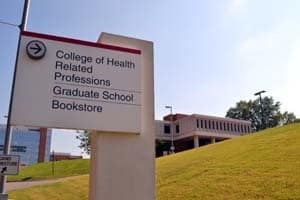UAMS Moving Toward Physician Assistant Program
| July 1, 2011 | A physician assistant program at UAMS could see its first students in summer 2013 after getting green light from the University of Arkansas Board of Trustees, the Arkansas Department of Higher Education, and the physician assistant accrediting agency. Physician assistants conduct physical exams, diagnose and treat illnesses, order and interpret tests, counsel on preventive health care, assist in surgery and write prescriptions with the supervision of a physician. The board’s May 20 approval began the approval and accreditation process for the program. The Coordinating Board of the Arkansas Department of Higher Education will act on the proposal this fall and with approval, UAMS will begin the accreditation process with the Accreditation Review Commission on Education for the Physician Assistant. “Arkansas already has a shortage of primary care physicians and there is no way that we can produce enough to meet the needs of our aging population and new patients entering the health care system because of health care reform,” said Douglas Murphy, Ph.D., dean of the UAMS College of Health Related Professions, which will house the program. “In this environment, these health care providers can contribute much to health care at a very high level in collaboration with a physician.” Murphy noted that a physician assistant can handle many of the routine cases a physician in a hospital or clinic might typically see. That would allow the physician to focus on additional patients or more complex cases. The dean anticipated starting the 24 -month, master’s degree program with 25-30 students, building up to about 40 students per class. The program will include classroom work and clinical rotations in hospitals and clinics where students would get hands-on experience working with patients under supervision. A program director is expected to be hired by the end of 2011. The director will coordinate the accreditation process, Murphy said, as well as begin to identify preceptors and clinical partners who would host physician assistant students. Murphy said he is discussing with the colleges of Medicine, Nursing and Pharmacy about possibilities for sharing faculty, resources and space. “We aim for our program to be a model interprofessional program where physician assistant students would take some classes with medical, nursing, pharmacy and other health professions students,” Murphy said. “I believe that when you educate the students together, that will prepare them for the patient-centered, team-based environment in which they will work.” Murphy said the college plans to work with the other colleges as well as with the state’s only other physician assistant program at Harding University to recruit clinical partners around the state. “If we all work together we’ll be able to identify many more preceptors and clinical education sites, which will pay off for everyone,” he said. Clinical rotations will take those students to numerous settings for experience with pediatrics, family medicine, internal medicine and obstetrics/gynecology. Murphy said students also will be exposed to surgery, geriatrics and other specialties. Elective rotations could include global health or clinic administration. A 2008 study by the UAMS Center for Rural Health estimated a shortage of 1,000 primary care physicians in the state, a number that increases as older physicians retire. Arkansas ranked 48th in physicians per capita in 2008. Murphy said potential students have already been asking about the program. In addition, he said, the college’s registrar is often asked for transcripts by students hoping to enroll in a physician assistant program outside the state. “We’re losing a lot of talent, because graduates would be more likely to stay in the state to start their careers if they are educated here,” he said.
|
